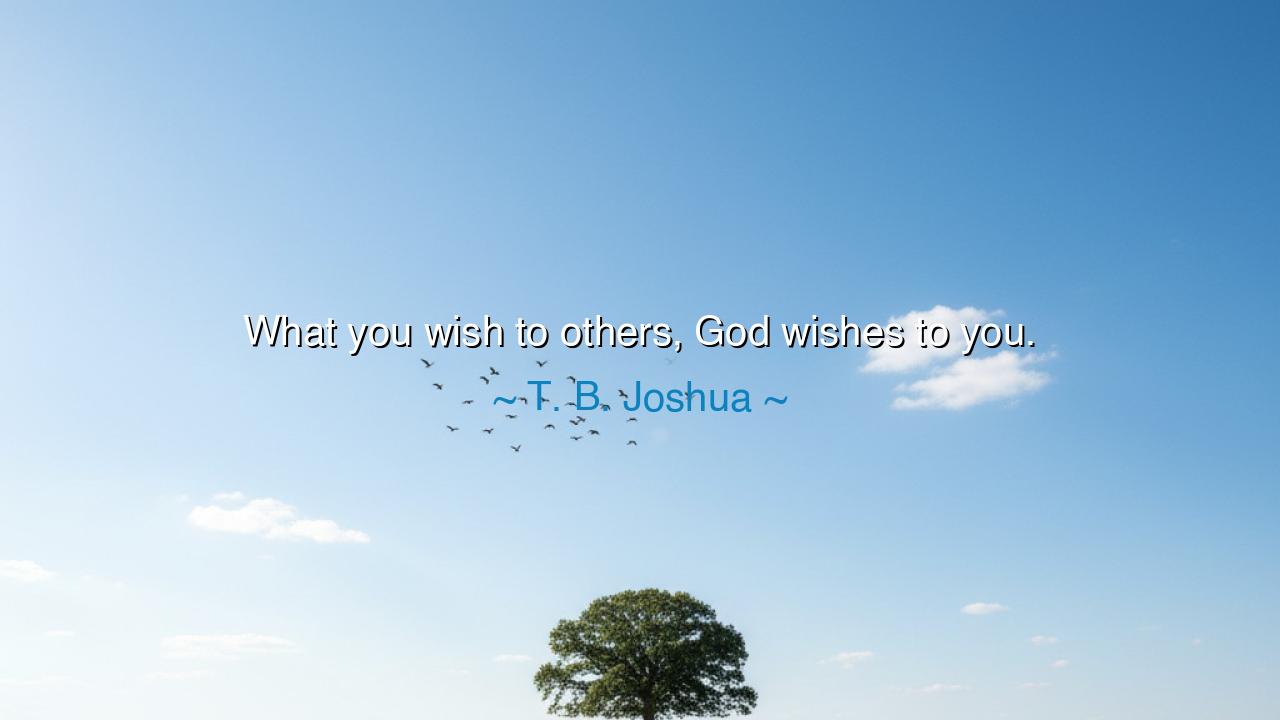
What you wish to others, God wishes to you.






The words of T. B. Joshua, the Nigerian pastor and spiritual teacher, carry a timeless resonance: “What you wish to others, God wishes to you.” In these words lies a profound reflection on morality, reciprocity, and the divine order of the universe. Joshua teaches that human actions and intentions are not isolated; they ripple outward, touching the fabric of life in ways seen and unseen. To act with love, kindness, and goodwill toward others is to align oneself with the will of God, for the divine reflects the intentions we project into the world.
The origin of this quote emerges from Joshua’s ministry, where he emphasized spiritual living through ethical conduct, compassion, and service. He often spoke of God as an active participant in human affairs, responding to the moral energy of the heart. In this teaching, he condenses the principle of reciprocity into a sacred law: our wishes for others are mirrored by divine favor. The message transcends cultures and religions, echoing the Golden Rule found in the texts of Moses, Jesus, Muhammad, and Confucius alike, reminding humanity that virtue in thought and deed resonates beyond the self.
At the heart of Joshua’s insight lies the understanding that intent shapes destiny. The thoughts we harbor toward others—whether of love or malice, generosity or resentment—create the spiritual atmosphere in which our own lives unfold. To wish well for others is to invite harmony, blessing, and divine goodwill into one’s own life. Conversely, harboring ill will not only corrupts the soul but invites disorder, reinforcing the timeless truth that life mirrors the energy we project.
History provides vivid examples of this principle. Consider Mother Teresa, who dedicated her life to serving the poorest and most marginalized. She wished goodness and care upon all she encountered, and in doing so, she became a vessel of divine blessing, inspiring millions and leaving a legacy of enduring love. Her life illustrates Joshua’s insight: in seeking the well-being of others, one aligns with God’s will, becoming a channel through which divine favor flows into the world.
Joshua’s teaching also emphasizes accountability and consciousness. One cannot act carelessly or wish harm upon another without consequence, for the spiritual and moral dimensions of life are intertwined. Just as rivers flow according to the laws of nature, so too does the universe respond to the currents of human intention. The divine, he reminds us, mirrors the heart: our blessings or misfortunes often arise from the energy we cultivate toward others.
Emotion courses through this teaching because it elevates everyday choices into acts of sacred significance. Every word spoken, every thought harbored, every desire projected toward another carries weight in the cosmic balance. By wishing others well, by cultivating empathy, compassion, and generosity, one participates in a divine rhythm that sustains life and harmony. The act of loving others is simultaneously an act of honoring the Creator.
Practically, Joshua’s wisdom calls us to deliberate kindness and intentional goodwill. Seek to uplift others in speech and deed, offer compassion without expectation, and act in ways that nurture harmony and understanding. In relationships, in communities, and in the broader world, recognize that what you wish to others becomes the conduit of God’s blessings in your own life. Ethical living is not abstract—it is practical, powerful, and transformative.
Thus, the words of T. B. Joshua endure as both counsel and inspiration: “What you wish to others, God wishes to you.” Let them guide the heart and the hand, reminding us that every act of kindness, every prayer for another’s welfare, resonates in the universe and returns in divine measure. In this understanding, life becomes a sacred exchange, a dance of intention and consequence, and the pathway to aligning with the eternal will of God.






AAdministratorAdministrator
Welcome, honored guests. Please leave a comment, we will respond soon